Iran Faces Severe Shortage Of High-Grade Gasoline
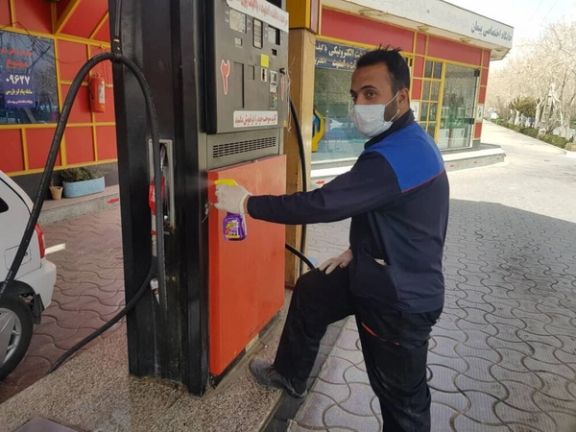
Javad Owji, Iran's Minister of Petroleum, has publicly acknowledged that the country is grappling with a critical shortage of high-grade gasoline.

Javad Owji, Iran's Minister of Petroleum, has publicly acknowledged that the country is grappling with a critical shortage of high-grade gasoline.
An investigation conducted by Iran International in August had revealed that the distribution of the premium gasoline in Iran plummeted by a staggering 90% in comparison to the same period last year.
High-grade gasoline, often referred to as Supercarburant in French, is a specialized type of fuel to which additives are introduced in order to enhance its octane rating, thereby improving its overall quality.
Owji, addressing the issue during a cabinet meeting on Wednesday morning, highlighted that high grade fuel like Euro 5 is being distributed during temperature inversions to mitigate air pollution.
In a conversation with Iran International, an anonymous source indicated that the inadequacy and delays in the annual maintenance of refineries are significant factors contributing to the decline in high-grade gasoline production.
Contrary to the claims made by the Minister of Petroleum, the distribution of Euro 4 and 5 standard gasoline has proven to have a limited impact on reducing air pollution, primarily due to its relatively small share in the daily gasoline consumption basket.
According to data obtained by Iran International, approximately 80% of the gasoline distributed does not meet the Euro 4 and 5 standards.
The findings indicate that gasoline production has dwindled to 100 million liters. However, the Ministry of Petroleum attempts to offset the deficit by increasing daily production to 115 million liters through the addition of non-standard and polluting substances.
Iran remains heavily dependent on revenues generated from crude oil exports, but due to international sanctions and systemic mismanagement, the country has struggled to modernize its energy sector.
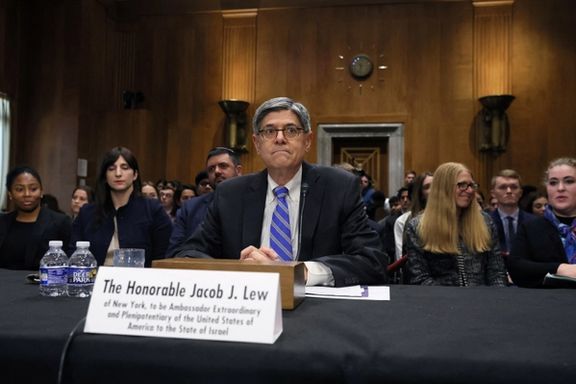
Leading Senate Republicans have expressed concern over Biden’s pick for ambassador to Israel because of his role in negotiating the Iran nuclear deal in 2015.
Jack Lew was Treasury Secretary during the Obama administration, when $400 million in cash was delivered to the Iranian regime on the day of the implementation of the deal.
“He was an ATM to the Iranian Ayatollah,” said Senator John Barrasso in Lews’ confirmation hearing Wednesday. “He oversaw the ransom payment to Iran — the massive influx of cash was ultimately a direct deposit into Iran's terrorism account.”
Other Republican members of the Senate Foreign Relations Committee were no kinder to Lew –although they did admit that a new ambassador has to be confirmed as quickly as possible, given the current situation in Israel.
Senator Marco Rubio slammed Lew for issuing a special license to help Iran access the US financial system in 2016. “You put on 200 roadshows around the world, encouraging banks… and telling them ‘don’t worry about sanctions, don’t worry about penalties.”
Lew, however, defended his record related to the Iran nuclear deal, while depicting the Islamic Republic as “an evil, malign government that funds its evil and malign activities first.”
“I don't think this is the moment for us to be negotiating with Iran,” the former Secretary said, as the Biden administration has held indirect talks with the Islamic Republic throughout the year about ways to reduce tensions and possibly limit the progress in Tehran's nuclear program.
The negotiations resulted in a US agreement to allow $6 billion in frozen Iranian funds to be unblocked in exchange for the release of five Iranian Americans held hostage by Tehran. Critics called the agreement the largest ransom payment in history.
Lew was also asked if the Biden administration can guarantee that the Islamic Republic will use funds returned by the US with the lifting of additional sanctions only for humanitarian purposes.
“I can’t say that there’s no leakage,” Lew responded, “to the extent that there’s leakage, it won’t change the thrust of what they do. Sadly, supporting terrorist organizations like Hamas and Hezbollah – that’s not very expensive.”
The debate about Iran’s role in funding militant groups has become more prevalent in Washington with the Hamas attack against Israel and the release of $6 billion that currently is parked in Qatari banks and is supposed to be used only for imports of medicine by the Iranian regime.
US lawmakers have doubled their efforts to force the administration to ‘refreeze’ the $6 billion, arguing that the regime in Iran will use funds to plan and support ‘malign’ actors and activities such as Hamas and October 7 attacks on Israel.
It is against this backdrop that the Senate is assessing Jack Lew’s nomination for the ambassadorial position in Israel.
“Biden’s nom for Israel ambassador, Jack Lew, is bad for the US & our strongest ally in the Middle East” Senator Joni Ernst posted on X (formerly Twitter). “The Biden admin has already been infiltrated by Iranian spies, we should not place an Iranian sympathizer in this position.”
While Lew only needs 51 votes to be confirmed, assuming his nomination is advanced by the Senate Foreign Relations Committee, any one senator can slow the process down on the Senate floor.
Senate Democrats say that confirming a new ambassador to Israel should be one of their highest priorities. The post has been vacant
“Given the dangerous state of emergency that Israel faces, the United States needs a confirmed U.S. ambassador in Jerusalem,” said Senate Foreign Relations Chair Ben Cardin as he began the hearing.
The post has been vacant since July 2023 when Thomas Nides finished his work as US ambassador to Israel.
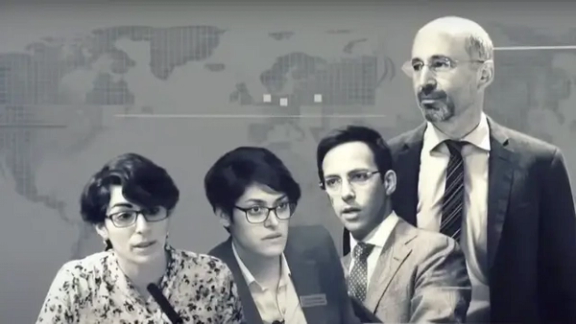
Former top US national security officials are asking the government to revoke security clearances for officials with “ties or sympathy for” the Iranian regime.
Semafor reported on Wednesday that senior Trump administration officials signed a statement saying, “As former senior officials in the United States Government we are very alarmed by the information contained in recent articles regarding Iranian influence operations targeting American citizens, especially US Government employees.”
Among the former officials are Secretary of State Mike Pompeo, National Security Advisor Robert O’Brien, Pentagon chief Christopher Miller, and Director of National Intelligence John Ratcliff.
The concern over potential security issues for the US government emerged when in September Iran International published a report based on a joint investigation with Semafor showing that several individuals close to, or part of the Obama and Biden administrations were acting as members of an Iranian government influence network in the United States.
“We are jointly speaking out in this unprecedented manner because of the clear and present danger Iran and its covert operations of many types, including its influence operations, pose to U.S. National Security,” the statement said.
The disclosure of an Iranian influence network has reverberated in the US Congress where many lawmakers have demanded answers from the Biden administration. In April, the security clearance of President Joe Biden’s Iran envoy Robert Malley was suspended, and he left the State Department, without being formally ousted from his position. Malley is under investigation for alleged mishandling of classified material.
Biden’s Iran policy has come under increasing scrutiny as his administration has failed to rigorously enforce US sanctions and in August agreed to release $6 billion of frozen Iranian funds.
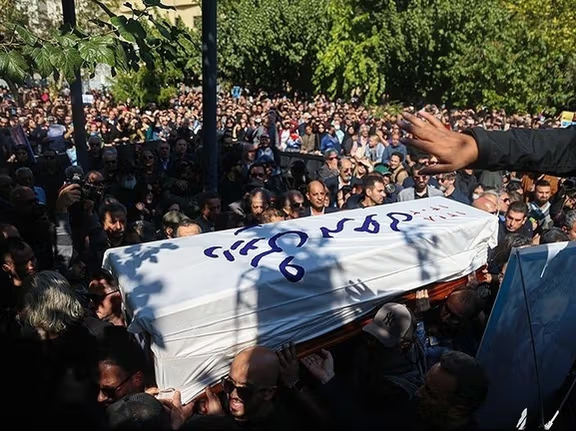
Attendees at the funeral of Dariush Mehrjui and his wife, who are suspected victims of a state-sponsored crime, chanted anti-government slogans in Tehran on Wednesday.
“Death to Khamenei”, and “Death to the perpetrator of this crime!”, chanted participants. Videos posted on social media also show many women not wearing the compulsory hijab and people chanting “Woman, Life, Freedom”, the signature slogan of last year’s nationwide anti-government protests.
Many Iranians believe the ruthless stabbing of the renowned filmmaker and his wife Vahideh Mohammadifar at their country home in Karaj Saturday evening strongly suggests state-sponsored murders similar to the chain murders of intellectuals in the late 1990s for which intelligence ministry agents were eventually found responsible.
Asked by reporters after a cabinet meeting Wednesday, Interior Minister Ahmad Vahidi accused the opposition of making these allegations to “instill insecurity in the society.”
Several of Mehrjui’s cinema colleagues and his daughter delivered brief speeches at the funeral ceremony outside Roudaki (Vahdat) Hall, a performing arts complex in central Tehran, attended by hundreds of artists and others.
“I feel like mom and dad are holding my shoulders and telling me to stand strong. As daddy said, murderers are really among us,” Mona, the couple’s young daughter who had defiantly attended the ceremony without headscarf, told the mourners.
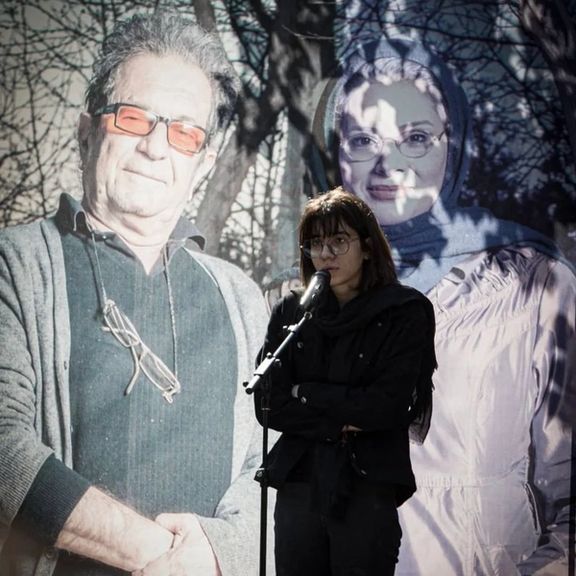
Mona was referring to a short video of her parents speaking in a dark room in a hushed, dramatic tone. “Long live freedom!” her mother says in the video clip and her father picks up from there. “Long live Freedom! Murderers are among us… We must be vigilant!” It is not clear in what context and when the scene was filmed.
The revered eighty-three-year-old director refrained from engaging in politics for many years. However, over the past year, he subtly expressed support for the ongoing Woman, Life, Freedom anti-regime movement. This support is speculated to be a possible reason for him being targeted by the state, according to some allegations.
Participants also expressed their disapproval by booing writer and actor Marzieh Boroumand who leads Khaneh Cinema, the largest association of filmmakers and actors in Iran, of which Mehrjui was also a member. This disapproval came during her speech when she referred to Israel as the Zionist regime.
Addressing the authorities, Boroumand said cinema people would fight alongside them with “Israel, the Zionist regime” if they were treated better.
Tehran’s support for Hamas and other militant organizations in the Middle East has led many Iranians to adopt a contrasting stance, favoring Israel in its military actions and condemning Hamas as the party that started the recent war in Gaza.
Police has so far twice refuted news of arrests reported by the media. Photos of the murder scene published by the media show grave negligence in securing the crime scene including by police officials who are seen walking around and giving interviews in the rooms where the murders took place without taking any precautions not to contaminate the scene.
The details of the fatal stabbing of Mehrjui and his wife evoke the state murders of dissident politician Dariush Forouhar and his wife Parvaneh Eskandari in November 1998 for many Iranians.
Naser Zarafshan who represented the families of some of the victims of the notorious chain murders in late 90s, including the Forouhars, has also highlighted that the similarities between the two double murders are striking. Those responsible for these murders sought leaving a striking mark rather than just killing a person, Zarafshan said while expressing concern over a cover up.
In a commentary published by the reformist Etemad newspaper on Tuesday, another prominent lawyer, Kambiz Nowrouzi argued that the manner of the killings which he said were very “theatrical,” and the fact that not much seems to have been stolen from the house, strongly suggest that the couple were killed to “terrify others, or even the whole society”.
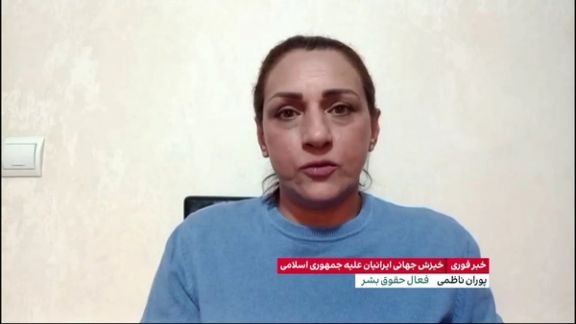
The Iranian judiciary has leveled serious charges against a group of civil and human rights activists.
Dadban, a collective of pro-bono lawyers in Iran defending political prisoners and human rights advocates, reported that the Judiciary of the Islamic Republic has accused several individuals of "Moharebeh," or war against God, and "Corruption on Earth," offenses that could potentially lead to the death penalty.
According to the disclosed information, the Islamic Revolutionary Court of Jiroft, a city located in the southern Kerman province, has initiated legal proceedings against at least four civil and human rights activists.
Among them is Puran Nazemi, a writer, poet, political activist, and human rights advocate. Nazemi, who has experienced multiple arrests and imprisonments over the past four decades, was detained twice during the anti-regime protests last year.
In late October 2021, intelligence agents conducted a raid on Nazemi's residence, subsequently transferring her to Evin Prison and placing her in solitary confinement. Although she was released two months later, she was re-arrested in February while visiting her father at a hospital and was then relocated to an undisclosed detention facility.
Dadban, relying on documentation acquired from an inside source within the Kerman Judiciary, has exposed that Nazemi and three other activists are also accused of endangering national security, inciting the public to commit acts against domestic security, insulting authorities and officials, and propagating against the Islamic Republic, among other allegations.
The identities of the other accused individuals have not been revealed. Throughout the Iranian uprisings against the Islamic Republic, around 22,000 citizens were detained, with many facing serious charges. To date, seven protesters have been executed.
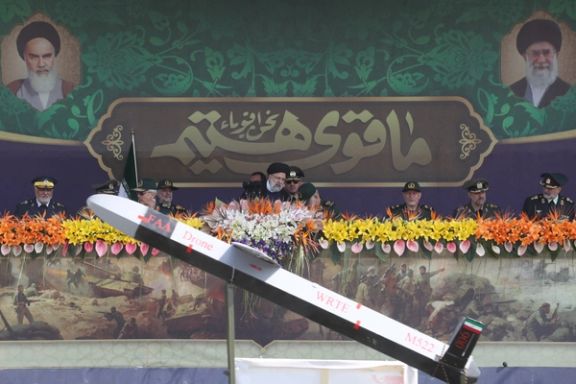
The UN sanctions on Iran’s missile program expired Wednesday, a victory for Tehran and raising concerns about the accelerated proliferation of its dangerous weapons.
The Iranian ministries of foreign affairs and defense issued separate statements announcing the end of UN prohibitions aimed at constraining Iran's missile and drone activities under Security Council Resolution (UNSCR) 2231, which endorsed the now defunct 2015 nuclear deal. The Islamic Republic is now free to sell its drones, ballistic missiles, and related long-range strike technologies to its anti-Western partners and clients and buy technology to develop more.
The lapsed prohibitions in UNSCR 2231 included sanctions on key individuals and entities connected to Iran's nuclear and military infrastructures. Annex B of the resolution prohibited activities such as development, tests, military employment, and others.
The three European parties of the Joint Comprehensive Plan of Action (JCPOA), the so-called E3, announced in September that they would keep their sanctions in place. However, the United States and E3 have not taken action to snap back UN sanctions or extend the UN's missile sanctions. A full snapback of sanctions would require a letter sent to the UN Security Council, informing it of Iran's noncompliance with UNSCR 2231.
The US on Wednesday tried to limit Iran's missile and drone programs by imposing new sanctions, warning companies how to avoid selling Iran sensitive technology and dusting off a 20-year-old program to stop weapons of mass destruction shipments, called the Proliferation Security Initiative (PSI).
The US Treasury said it imposed sanctions on 11 individuals, eight entities and one vessel based in Iran, Hong Kong, China and Venezuela that enable Iran's "destabilizing" ballistic missile and drone programs.
The US government also issued an "Iran ballistic missile procurement advisory" to industry laying out what it said were the deceptive practices that Iran uses to obtain parts for its ballistic missile program from around the world.
In a joint statement, more than 45 states, including the US and close allies in Europe and Asia, committed to uphold the 2003 PSI designed to stop shipments related to weapons of mass destruction.
"The sanctions relief "was based on the assumption that Iran would take the necessary steps towards restoring confidence in the exclusively peaceful nature of its nuclear program. This has not happened," the joint statement said.
In a separate statement, US Secretary of State Antony Blinken said, “We see the horrific impact of Iran’s provision of missiles and unmanned aerial vehicles (UAVs) to designated terrorist organizations and militant proxies that directly threaten the security of Israel and our Gulf partners.”
"We see the destructive result of Iran’s transfer of lethal UAVs to Russia to target critical civilian infrastructure and kill civilians in Ukraine," he added, saying Washington would use "every tool at our disposal" to counter Iran’s development, procurement and proliferation of missiles and drones.
EU countries cite several reasons for keeping the sanctions: Russia's use of Iranian drones against Ukraine, the potential transfer of ballistic missiles from Iran to Russia, and Iran's violation of the nuclear deal, which has deprived Tehran of its benefits. However, they are unwilling to pursue a snapback. Snapback is a process that would result in the restoration of six UNSCRs on Iran from 2006 to 2010, along with the reinstatement of all their associated prohibitions and penalties. These measures were agreed upon in the JCPOA to ensure that Iran recognized the consequences of any non-compliance, consequences that cannot be thwarted by Russia and China, Iran's Security Council allies with veto power.
“Lapsing UN penalties on Iran’s ballistic missile tests, transfers, and other activities will be yet another sign of the international community’s irresolution to say and do the right thing on Iran. It will, therefore, embolden Iran to double down on its terror proxies and arms proliferation. The more confident Tehran feels, the more lethal the threat,” said Behnam Ben Taleblu, a senior fellow at US-based think-tank the Foundation for Defense of Democracies (FDD).
Additionally, sanctions by the E3 only restrict Iran’s missile trade with the European countries and do not extend to third parties. It practically means Iran can legally trade weaponry with Russia for the invasion of Ukraine.
On Tuesday, Russia said it need no longer obey UN Security Council restrictions on giving missile technology to its ally Iran once they expire, without explaining if it plans to support Tehran's missile development.
"Supplies to and from Iran of products falling under the Missile Technology Control Regime no longer require prior approval by the UN Security Council," Russia's foreign ministry said. Russia has grown close to Iran since invading Ukraine in February 2022 and would likely use the easier flow of missiles to facilitate its invasion. Many of the hundreds of one-way attack drones it has used to bomb Ukraine in the last year were Iranian made.
Russia urged both the EU and the US to drop their sanctions, which it said were "an effort to settle political scores with Tehran" and had no implications for "other countries that treat international law and their obligations with due respect".
Iran’s Foreign Ministry said, “According to the provisions of 2231 UNSC Resolution, termination of these restrictions, does not require any resolution, statement or any other action in the context of the UNSC and occurred automatically."
As a result of the sanctions expiration, Iran’s can make money from missile sales and then use the profits to finance its militant and terror proxies in the Middle East.